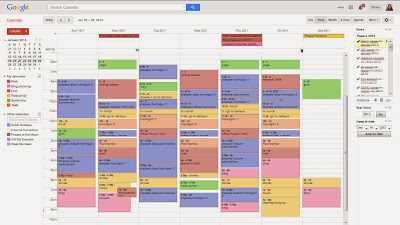
When regular schedules aren’t working anymore
| My template from Fall 2014 |
For many years, I was the person who wrote first thing in the morning (at least, of the morning part of my work day), every week day (except when traveling).
Recently, I’ve been encountering two challenges with this approach:
– early morning meetings
– working from home
Let me delve deeper into this.
As I’ve gone from researcher to assistant professor in Delft, I am supervising way more students (7 MSc and 3 PhDs at the moment, with 3 more PhDs co-supervised internationally). When I’m in Ecuador, the hours 7am – 10am are 2pm-5pm in the Netherlands – which means that many days the only possible time to meet my students and colleagues overseas is in my sacred morning writing block time. At this moment, it is even so that most weeks, I have only 1 or 2 of my early morning writing blocks that sit untouched from meetings.
The second issue is that there’s a big difference between 7am-9am in my university office at the end of a hallway where nobody finds me and my desk at home, which, during rush hour in the morning sits in the middle of everything: my daughter waking up, my husband walking around calling on the phone, and the cat crying for food. Needless to say, I don’t get the concentrated writing done.
So, what have I done to solve this? So far, honestly, I am struggling with my writing. 2020 has not been a good year for writing articles. It’s been a lot.
But, I’ve tried to move forward by doing the following:
Focus on what needs to be done, not when: If it’s not going to happen 7am-9am, it’s OK to write later in the day. As long as I find some time during the day, often a shorter block than 2 hours, I can make progress. Some progress is still better than no progress at all.
Get breaks to refresh: There’s a difference between writing fresh in the morning and writing after 3 back-to-back Zoom calls. What I’ve been using these past months is going out to walk around the block to reset my head. Sometimes I listen to a podcast or a motivational talk, but many times I set out with the goal of thinking through the next part I will write. As I circle around my gated community, talking to myself (I assume nobody can see this behind my mask), I flesh out ideas and then write these down when I return to my desk.
Plan on a weekly basis: I use my weekly priorities to identify which paper needs to progress during which week. If I’m not able to write every day for 2 hours, I may be able to fit in a writing block on a different day – a longer block, or a later block – to move my manuscript forward.
Pomodoros: If I’m tired after Zoom calls, I return to my pomodoros to focus for short amounts of time and move my writing forward.
As a last thought: my identity of the person who writes first thing in the morning every work day is something I developed in 2014, as I had just moved to Ecuador. For my PhD, 8am lab work meant that early writing sessions were not an option. I wrote my thesis in the evenings, after lab work. I need to remind myself of my past: I can adjust back when my regular schedule isn’t working anymore.




[…] When regular schedules aren’t working anymore […]